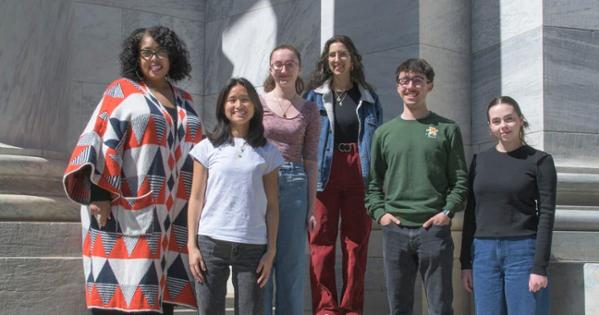Speaking to the Nation

It can take a while for any reporter to land their first national byline.
But in School of Communication professor Sherri Williams’ Race, Ethnic and, Community Reporting class, a small group of AU students will have that opportunity before they wrap up the spring semester.
As part of their work reporting weekly stories centered on racial and marginalized groups, Williams’ students pitched their final enterprise story idea about a topic related to the 2024 elections to the Nation, a monthly print magazine founded in 1865 by abolitionists. They are vying for bylines in StudentNation, a collection of first-person accounts by student journalists on youth-oriented movements for social justice, economic equality, and tolerance.
“There are professional journalists who have been working for years who haven’t been published by a publication of this stature before,” said Williams, who was recently named winner of the Association for Education in Journalism and Mass Communication’s 2024 Teaching Committee Best Practices Award. “Having a byline in the Nation can really show potential employers—whether it’s an internship or an entry-level job—that these students are capable of producing solid journalism.”
The Vision 2024 Student Journalism Election Project is a win for both hands-on, experiential learning opportunities and journalism, said Peter Rothberg, associate publisher for special projects at the Nation.
“We’re already looking for the student perspective on the 2024 election,” Rothberg said. “From my perspective, we’re getting something we need anyway filtered through Professor Williams’ expertise. She’s working with these students in a concerted way. Most of our articles don’t have the benefit of editorial intervention in that way.”
By the end of the semester, the work of seven AU students in the class will have the potential to be published in the Nation in fall 2024, Williams said. Over the summer, those selected will work further with the magazine to update and hone their stories before going through a rigorous fact checking process.
When Dima Amro, SOC/MA ’24, discovered the opportunity was part of the course, she pushed herself to produce her best work. While chipping away on a story about the opinions of young Palestinian-American voters, she’s doubled the usual number of sources she typically would have interviewed.
“I was specifically just focusing on the DC area,” said Amro, who is Palestinian. “After being told that I could possibly be published in the Nation, I decided to expand my scope.”
Amro, an American University-Washington Post practicum program researcher, said it’s important for the country to hear from its youngest voters as the country heads into a landmark election.
“I think it’s important to showcase how the younger generation is looking at the election and looking at candidates,” said Amro. “A lot of people find Generation Z to [have] more ‘liberal’ ideals, and I think this story will be able to really show what their views are and how that is being translated into how they’re voting.”
Another student in the class, Kaishi Chhabra, SOC/MA ’24, is investigating how young voters are using digital activism to advocate for reproductive justice. It’s the first time that she’s had a chance to write a story geared toward a younger audience, and she has turned to TikTok for sources.
“I have never done a tech savvy kind of topic in a story,” Chhabra said. “I am really excited to tie in something I’m passionate about with something that is such a cultural phenomenon.”
While making a difference in the career growth of her students, Williams said her class is a step toward making the journalism field more inclusive.
Most of the students in her Race, Ethnic, and Community Reporting “want to learn how to better represent their own communities,” Williams said. “It is important to help these students get a solid start in their careers because journalism is still a profession that is very White and pretty much dominated by men.”
